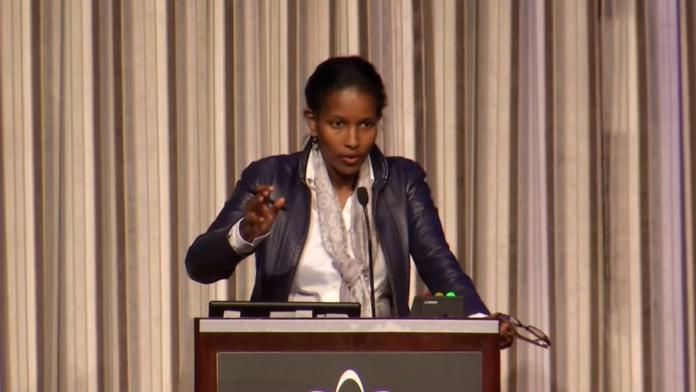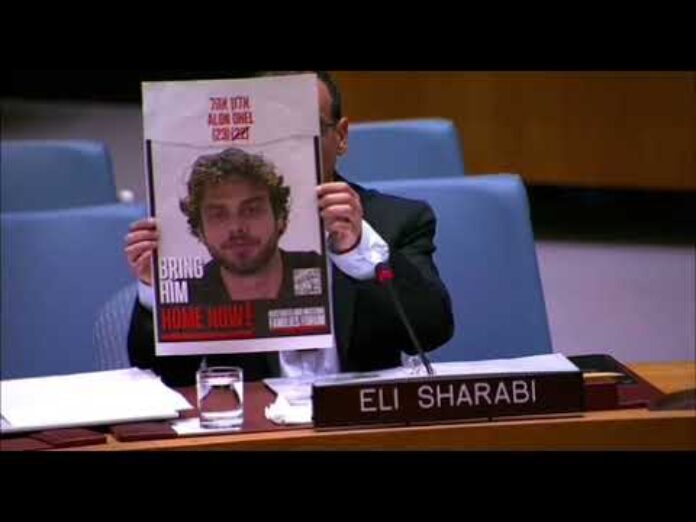Israel’s UNRWA ban went into effect on Jan. 30 but has been only partially implemented. That worries activists and Knesset members involved in the effort to shutter the terrorism-linked U.N. agency.
To help ensure the law is applied, Likud MK Dan Illouz, who sponsored one of the two bills to bar UNRWA (full name the United Nations Relief and Works Agency for Palestine Refugees in the Near East), formed the Knesset Lobby for Closing UNRWA. It held its first meeting on Feb. 20.
“We know and have experience that very often laws that are enacted in the Knesset are not necessarily applied,” Illouz told JNS.
The two bills, passed into law on Oct. 28, merged four separate private bills. “They were all put together and translated into two historic laws that are meant to put an end to UNRWA’s effective presence in any area controlled by Israel,” Illouz said.
The first law prohibits UNRWA from “operating any representative office, providing any service, or carrying out any activity, directly or indirectly, in the sovereign territory of the State of Israel.”
The second law prohibits any Israeli authority or public servant from dealing with UNRWA. “A government authority, including other bodies and individuals performing public duties according to law, shall not have any contact with UNRWA or anyone acting on its behalf,” the legislation states.
“These two laws together make it almost impossible for UNRWA to continue acting long-term in Israel,” Illouz said.
The key is making sure they are fully enacted. He noted that a mechanism is built into the laws requiring the Foreign Affairs and Defense Committee to meet every three months to track the enforcement progress. However, those meetings will be mainly closed-door, leading Illouz to form the lobby.
“There’s a lot of knowledge in what we call in Israel the civil sector—NGOs and the like. I wanted this lobby to be a platform in which those organizations could share their findings with members of Knesset,” he said.
Opening the first meeting, Ilouz reviewed why UNRWA needed to go. “UNRWA not only teaches terrorism, it participates in it. UNRWA not only teaches children to murder, it lets Hamas use its schools for weapons storage,” he said.
‘Failed in its duty’
Several activists addressed the lobby session, which became heated at times. Noga Arbell, a public policy analyst who helped shape the legislation, lashed out at the government, including Illouz, for tarrying in its effort to close UNRWA’s operations.
“UNRWA could have been closed without the law. The Israeli government has all the authority. It is the sovereign. Our government has failed in its duty to protect the public from the threat that is UNRWA,” she said.
“Also, scheduling follow-up every three months … it’s not serious. Do you want to apply the law? Then meet every week and ask what you did today to close UNRWA. It shouldn’t take three months. In three months, there shouldn’t be a trace of this thing here,” Arbell said.
She also criticized the Foreign Affairs and Defense Committee for holding its meetings behind closed doors, something that was without justification according to the Knesset’s own criteria for confidential hearings, she said.
Illouz defended MK Yuli Edelstein, chairman of the Knesset Foreign Affairs and Defense Committee, noting he was a “full partner” in the mission to shut down UNRWA.
Aharon Garber, deputy director of the law department at the Kohelet Policy Forum, a Jerusalem-based think tank, warned of the possibility of interference by the High Court of Justice.
Garber noted that while the court had rejected a petition by two radical NGOs, Adalah—The Legal Center for Arab Minority Rights in Israel and Gisha—Legal Center for Freedom of Movement, requesting that it issue an injunction suspending the laws’ implementation, it didn’t reject the appeal outright, leaving the possibility that it would intervene at a later date.
“There’s still a chance the court could reject the laws. I don’t envision that will happen because those laws passed with a huge majority,” Illouz said. The laws passed 92-to-10.
“It would be unprecedented because of the subject matter, which is foreign policy,” Illouz added. “Unfortunately, the court has done unprecedented things many times in the past and so it’s always something we have to watch out for.”
MK Yulia Malinovsky of Yisrael Beitenu, an opposition party, co-sponsored the law with Illouz. She also criticized the government’s failure to implement the laws in full, tweeting on March 10 slamming six coalition ministers, among them Minister of Energy and Infrastructure Eli Cohen, for not cutting power to UNRWA buildings, and Minister of Finance Bezalel Smotrich for not closing UNRWA’s Israeli bank accounts.
Illouz said that Malinovsky, as a member of the opposition, would naturally focus on the government’s failures. Still, he admitted, “We have to say she’s right. We have to get to 100%. But to focus only on the 20% that hasn’t been done is unfair. This government has passed a historic law, and it’s on the right track to implement it.”
David Bedein, director of the Jerusalem-based Center for Near East Policy Research, who has spent 35 years warning about UNRWA, said that Israeli business interests also may try to torpedo the legislation.
“There are 450 Israel corporations that operate in Judea, Samaria and the Palestinian Authority,” Bedein told JNS.
“These corporation have a de facto monopoly providing supplies to the P.A. and UNRWA facilities. For example, Dor Alon [an Israeli energy company] has a monopoly on providing gasoline inside UNRWA and the P.A. These companies don’t want anyone to mess with that,” he said.
“We’re looking into the things that David has brought up,” Illouz said. “It’s too early to say, but I tend to trust David because he’s been right on this subject for years.”
Bedein also expressed concern that “State of Israel” will be defined down. “From my point of view, ‘within Israel’ includes all of Judea and Samaria. However, certain politically correct people say otherwise. It’s a crazy interpretation but people have interpreted this law to only apply to pre-’67 Israel.”
Defining Israel’s borders
Juliette Touma, UNRWA’s director of communications, certainly sees it that way. “There is a difference between how we define in the United Nations the borders of the State of Israel and how Israel defines it. Because for the U.N., east Jerusalem is occupied territory and so we treat it as such.”
Touma said the laws barring UNRWA definitely have impacted operations. The agency’s employees are no longer working from UNRWA’s Jerusalem headquarters, which is responsible for Judea and Samaria—what she refers to as “the occupied West Bank, including East Jerusalem”—as their visas have expired. Some have gone to Jordan while others returned to their home countries to work remotely.
UNRWA has hired a security service to guard the building “but we don’t have international staff in it now because we don’t have visas,” she said. “And our local staff are understandably absolutely terrified. We’ve had several incidents of local staff being summoned by the police.”
Otherwise, UNRWA’s services in Jerusalem continue. “Two areas of focus are our schools that have 50,000 boys and girls, and also our primary healthcare clinics,” she told JNS. “However, since the law came into effect, there have been several attempts to close some of our facilities down.”
A small number of international staff remain in Gaza, the location of UNRWA’s main headquarters. Their focus is on humanitarian aid, she said.
UNRWA remains in the dark as to its future. “We’ve not received any communication from the State of Israel on how they plan to implement these two laws,” she said.
The biggest challenge is the law barring Israeli officials from communicating with the agency, Touma said. “What it means is that we’re not receiving any resources from the Israeli authorities; that we’re not able to call them as we used to.
“We also face a huge disinformation campaign and labeling campaign that bullies our staff, that refers to our staff as terrorists, and that links each and every single person who works for the agency, regardless of where they work, regardless of whether they’re local or international, as Hamas, or Hamas-affiliated, or terrorist-affiliated, and that’s harmful,” she added.
UNRWA continues to refer to Israeli revelations about the agency’s terrorism ties as “disinformation,” but the U.N.’s Office of Internal Oversight Services (OIOS) confirmed that Israeli claims about the involvement of UNRWA employees in the Oct. 7, 2023, massacre were true.
Israel also uncovered “deep and systemic infiltration” by terrorist organizations, especially Hamas, into the ranks of UNRWA.
Illouz said that UNRWA has gone on a worldwide sympathy campaign, describing “how bad things are for it on the ground in order to try and get more money.”
His advice to the international community: ignore it. “The international community’s budget would be much better served investing in recognized international organizations that haven’t been infested with terrorism,” Ilouz said.
Bedein said anyone with lingering doubts about UNRWA should just look at its curriculum, which advocates for the “right of return” for descendants of Arab refugees and indoctrinates children to commit violence.
Despite his concerns, Bedein is optimistic that the agency will be closed. “Hundreds of IDF soldiers in Gaza saw UNRWA’s facilities stocked with weapons and ammunition. It’s no longer a theoretical problem,” he said.




















